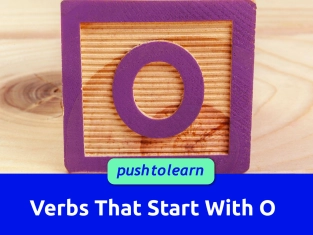by PushtoLearn
Verbs That Start With Y
Table of Contents
Verbs That Start With Y Exercises and Flashcards
These exercises focus on Verbs That Start With Y
List of Top Verbs That Start With Y
|
Verb |
Definition |
Example |
|
Yank |
To pull something abruptly or forcefully. |
He yanked the door open in frustration. |
|
Yawn |
To open the mouth wide as a reflex of fatigue or boredom. |
She yawned during the long meeting. |
|
Yearn |
To feel a strong desire or longing for something. |
He yearned for the comforts of home. |
|
Yield |
To give way or submit to pressure. |
The driver yielded to oncoming traffic. |
|
Yell |
To shout or cry out loudly. |
The coach yelled instructions from the sideline. |
|
Yoke |
To join or bind together. |
The oxen were yoked to the plow. |
|
Yodel |
To sing by alternating pitch with rapid changes. |
She yodeled at the festival. |
|
Yoke |
To harness or attach for work. |
The farmer yoked the animals to the cart. |
|
Yip |
To bark or yelp sharply. |
The puppy yipped with excitement. |
|
Yo-yo |
To move up and down repeatedly. |
His emotions yo-yoed between hope and despair. |
|
Yoke |
To burden or oppress metaphorically. |
She felt yoked by endless responsibilities. |

Featured Verbs Grouped by Topics
1. Emotional Expressions
-
Yearn: To long for or desire something deeply.
Example: "He yearned for a better future." -
Yell: To express feelings loudly, often anger or excitement.
Example: "She yelled at the top of her lungs to get attention."
2. Physical Movements
-
Yank: To pull something with force.
Example: "He yanked the curtain shut." -
Yawn: To open one’s mouth wide as a reflex.
Example: "She yawned after a long day of work."
3. Commands and Submissions
-
Yield: To give way or comply.
Example: "The soldier yielded under orders."
4. Specialized and Musical Contexts
-
Yodel: To sing with alternating pitches.
Example: "The performer yodeled to entertain the crowd." -
Yo-yo: To fluctuate or move up and down repeatedly.
Example: "Stock prices yo-yoed all week."
Everyday Use of Verbs Starting With Y
-
Yank: "He yanked the drawer open to grab a pen."
-
Yawn: "The baby yawned and fell asleep in her arms."
-
Yield: "She yielded her spot in line to the elderly woman."
-
Yell: "He yelled for help when he saw the fire."
-
Yearn: "They yearned to reunite after years apart."
Common Mistakes
1. Confusing “Yield” with “Give”
-
Mistake: "She yielded the book to him."
-
Correction: "She gave the book to him."
-
Tip: Use “yield” for situations requiring submission or compliance.
2. Overusing “Yank” for Gentle Actions
-
Mistake: "He yanked the curtain to adjust the light."
-
Correction: "He pulled the curtain gently to adjust the light."
-
Tip: Reserve “yank” for abrupt or forceful movements.
3. Misusing “Yo-yo” in Formal Writing
-
Mistake: "His emotions yo-yoed between excitement and anxiety in the report."
-
Correction: "His emotions fluctuated between excitement and anxiety in the report."
-
Tip: Use “yo-yo” in informal contexts only.
4. Using “Yoke” Instead of “Join”
-
Mistake: "The pieces were yoked together with glue."
-
Correction: "The pieces were joined together with glue."
-
Tip: “Yoke” typically implies forceful or purposeful binding.
5. Confusing “Yodel” with Other Singing Techniques
-
Mistake: "She yodeled a lullaby to the baby."
-
Correction: "She sang a lullaby to the baby."
-
Tip: Use “yodel” for the specific technique of alternating pitches rapidly.
FAQ
What is the difference between “Yield” and “Relinquish”?
Yield implies giving way under pressure, while relinquish is more voluntary.
Example: "He yielded his position to the stronger opponent" vs. "She relinquished her role willingly."
Can “Yo-yo” be used figuratively?
Yes, it can describe fluctuating situations or emotions.
Example: "The stock market yo-yoed throughout the day."
Is “Yodel” a common verb?
No, “yodel” is mostly used in specific musical or cultural contexts.
Can “Yoke” be used positively?
Yes, it can mean joining forces, but it is more often used for burdens or constraints.
Example: "The two organizations were yoked together for the project."
5. What’s the difference between “Yank” and “Pull”?
“Yank” implies sudden force, while “pull” can be gentle or gradual.
Example: "He yanked the rope to signal the crew" vs. "She pulled the rope slowly to adjust the sail."
Explore other Verbs:

